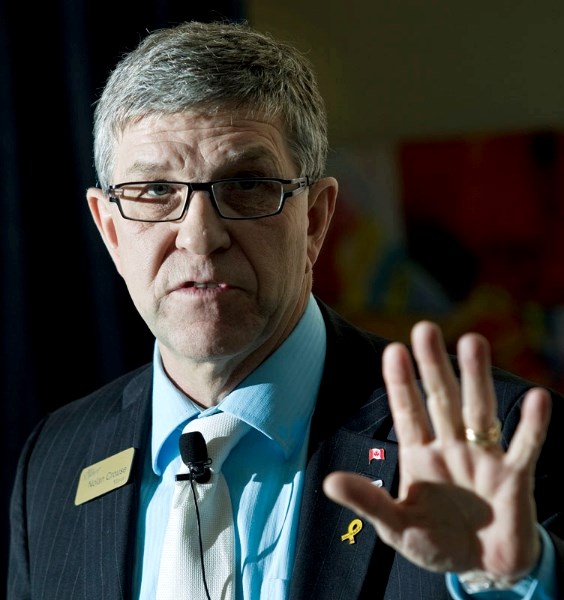Having a potential future premier in the room was an opportunity Mayor Nolan Crouse couldn't pass up in his desire to press the province for a change in the way municipalities are funded.
While delivering his state of the city address on Wednesday, Crouse veered briefly from summarizing council priorities to take a “provincial moment” aimed at MLA Doug Horner, who announced last week that he'll seek the leadership of the Progressive Conservative party.
“While the maybe ‘Mr. Potential Premier' is here, maybe you can help us … we do have a very challenging financial model out there,” Crouse said.
“I believe that the current structure of financing of municipalities and cities across Canada is perhaps archaic and needs to be … changed.”
Crouse later elaborated that the federal and provincial governments have the ability to tax anyone who earns income, while municipalities are left to tax property owners, a less robust way to raise money, he argued.
“It appears that we're subservient in too many ways to other orders of government,” he said in an interview. “You end up being at the mercy of grant money and something doesn't seem right about that … you are at the mercy of the province to determine whether or not you have infrastructure.”
When it came to offering solutions, Crouse was less certain.
“I honestly don't know,” he said. “I don't have a solution.”
He did bring up the province's municipal sustainability initiative as an example of funding that's welcome except that it has an end point.
“Maybe the model is you can count on so much per capita forever. You can't have a model that's going to end in 2013,” Crouse said.
When asked for his take, Horner said the mayor's message is one the province is discussing with municipal groups. He didn't offer any assurances that he's willing to change the status quo.
“You can't guarantee a revenue source. We've talked about that in terms of even with our own revenues,” Horner said. “You can't say, ‘thou shalt get x dollars' because we don't know what's going on [with provincial revenues].”
He countered Crouse's argument by saying that municipalities already have the ability to tax and thereby generate their own revenue.
“I'll come back to this — there's one taxpayer, so let's be careful what we're talking about,” Horner said. “Are we then going to get rid of property taxes across Alberta or across Canada?”
That's actually an idea some pundits are talking about, said Darren Aldous, president of the Alberta Urban Municipalities Association (AUMA.) While the AUMA isn't promising to eliminate property taxes, Aldous thinks the idea warrants debate.
“Will property taxes go away? I don't see that happening any time soon but we need to have a robust discussion on what does the future state look like,” he said.
The municipal funding model has been on the radar for years and was the top issue to emerge from the AUMA's annual convention in November, Aldous said. He felt Crouse “hit the nail right on the head” in describing the relationship between municipalities and the province.
“Our perception is that it's a very paternalistic relationship. They make the rules; we play by them. If we don't like it we don't get the money,” Aldous said.
“We're talking about a new relationship that would include a permanent transfer. We're looking for a percentage of provincial revenues.”




